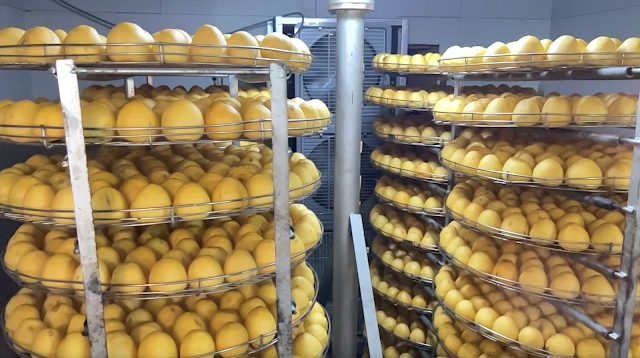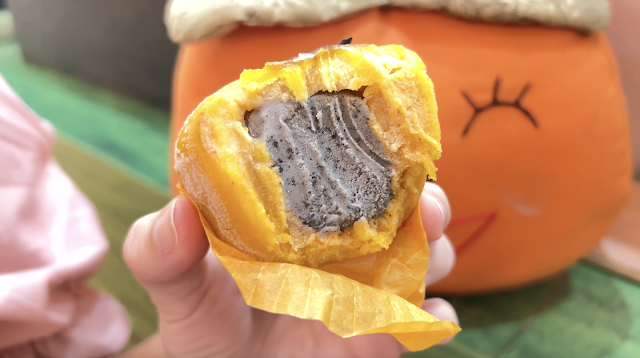Travel Date: 2024/10/11
During the 10.10 long weekend (which wasn't truly a long weekend since Friday was a working day, but we took the day off), we visited Chiayi. Our adventure began in Fanlu Township, known for its persimmon production. I discovered something interesting: while Hsinchu is often recognized for its persimmons, particularly from Xinpu due to its unique sun-drying method, Chiayi actually has the largest persimmon production in Taiwan.
After exploring the persimmon processing, we headed to an indigenous village for a leisurely stroll. Later, we made our way to Chiayi City, where we revisited some famous landmarks, including the Chiayi Old Prison and Hinoki Village, a cluster of buildings from the Japanese era. We enjoyed a bike ride around the city, sampling the local delicacy of turkey rice and stopping by the intriguing turkey pedestrian crossing (stay tuned for more details on that!).
To wrap up the day, we rode our bikes around Chiayi Park, which is quite spacious and conveniently located near where we parked. It was a fun-filled day, but I must admit that Chiayi isn't particularly pedestrian or bike-friendly. Sidewalks are rare, so if you're not comfortable navigating roads alongside cars and scooters, this city might not be the best choice for you.
I've divided this trip into two posts. In this one, I introduced the persimmons, while the next will cover attractions in Chiayi City. Be sure to check it out! [LINK]
Yinbing Persimmon and Tea Collection (Fanlu Township Farmers' Association)
Nestled at the foot of Alishan in Chiayi County, Fanlu Township serves as a vital route for the indigenous Tsou people. The region is renowned for its expansive tea plantations, persimmon orchards, and diverse fruit trees. Each season - marked by winter dew, summer rains, spring blossoms, and autumn harvests - contributes to a vibrant atmosphere, aptly dubbed “Persimmon Season and Tea Country.”
The autumn and winter seasonal delicacies of Fanlu Township not only carry a deep cultural significance but also reflect the commitment of the Fanlu Township Farmers' Association to the quality and innovation of local specialty products. As Taiwan's largest persimmon-producing area, Fanlu Township benefits from its unique climate and soil, which yield sweet and flavorful persimmons. These persimmons are transformed through a special processing method into the highly favored persimmon cakes. On September 20, 2024, the Fanlu Township Farmers' Association officially kicked off the new persimmon cake processing season.
Founded in 1920, the association underwent several transformations. It was renamed in 1944 to the “Fanlu Village Agricultural Association,” and then divided into the “Farmers' Association” and “Cooperative Society” in early 1946. In 1949, it was officially renamed the “Fanlu Township Farmers' Association,” marking the beginning of its governance with the election of its first board of directors and supervisors, a tradition that has continued through 18 terms.
In 1989, the organization introduced high-mountain tea cultivation, providing farmers in the Xiding community with training in tea production techniques.
The Xiding community, situated within the Alishan mountain range, enjoys an ideal climate and geography for producing high-quality tea. Its commitment to sustainable practices, including water and soil conservation, has cultivated a thriving “tea garden ecology,” characterized by terraced landscapes that evoke a paradise. Locally sourced stone retaining walls create sturdy structures that have weathered natural disasters for decades, reflecting the tea farmers' respect for nature and their commitment to harmonious coexistence with the environment.
The association is committed to protecting farmers' rights, enhancing their knowledge and skills, promoting agricultural modernization, increasing production profits, improving livelihoods, and fostering the rural economy.
Their mission is to showcase the deliciousness of Taiwanese agricultural products through innovative industrial transformation and modernization, encompassing production, processing, tourism, and experiential services. They aim to captivate visitors with the boundless creativity of the farmers’ association while ensuring fair compensation for the dedicated farmers who cultivate this fertile land.
Fanlu Township is the largest persimmon-producing region in Taiwan. Historically, farmers shipped their persimmons to Hsinchu for processing, contributing to Beipu’s fame for persimmon cakes but often falling victim to price-cutting. To combat this, in 1997, the Fanlu Township Farmers’ Association began guiding local farmers in persimmon cake production techniques and equipment to process surplus persimmons locally.
Focusing on the core local agriculture of “persimmons and Alishan tea,” they developed the unique “Persimmon Fruit Ice Cream Series,” drawing inspiration from Liang Qichao’s celebrated Yinbing Studio Collection. This connection across time inspired the creation of our brand: the “Yinbing Persimmon and Tea Collection.”
Development of the Persimmon Industry
In 1997, the “Fanlu Township Farmers' Association Persimmon Cake Processing Station” was established, marking entry into persimmon cake production and sales.
By 2009, all processing equipment was upgraded to utilize indoor constant-temperature baking, adhering to stringent production standards that significantly improved both yield and quality.
Each autumn, the organization host a three-month-long “Persimmon Season” and “Persimmon Tea Township Exhibition,” promoting local consumption. This initiative empowers persimmon farmers to sell directly to markets, bypassing middlemen and controlling pricing.
In 2012, they transformed the traditional persimmon cake processing system into a “tourism factory model.” The factory now offers free guided tours for schools and organizations by appointment, allowing visitors to engage in DIY activities and fruit-picking tours that celebrate the unique charm of the persimmon industry while fostering food and agricultural education and preserving local cultural heritage.
In 2013, the “Yinbing Persimmon and Tea Collection” brand was launched, concentrating on key industries such as persimmons, Alishan tea, and patented persimmon ice cream products.
In the past, persimmon cake production relied on natural sun-drying, which was difficult to control due to unpredictable weather and external factors. To address these issues, after the establishment of the Persimmon Cake Processing Station in 1997, the association introduced modern temperature-controlled drying technology in 2007, ensuring that every persimmon cake is transformed into a golden, chewy, and honey-sweet delicacy in a stable environment. In addition to producing high-quality persimmon cakes, the association has also focused in recent years on developing agritourism, transforming traditional agriculture into a multi-faceted industry combining production and tourism. The Persimmon Cake SPA Workshop allows consumers to understand the production process and experience the traditional craftsmanship and cultural heritage of persimmon cake processing firsthand.
The interactive experiences at the Persimmon Cake SPA Workshop not only allow consumers to taste the local agricultural delicacies but also to appreciate the commitment and responsibility of the Fanlu Township Farmers' Association towards agricultural products. Visitors can experience the exquisite craftsmanship behind this seasonal treat up close. The Fanlu Township Farmers' Association continues to promote agricultural transformation and upgrades, expanding marketing channels, with the hope that more people will come to know and enjoy this local delicacy from the foot of Alishan.
Alishan Tsou Tribe
If you want to have a close encounter with adorable Sika deer, you don't need to go all the way to Nara, Japan! Alishan Zhu Lu Tribe has a deep connection with Sika deer, where you can not only feed the deer but also experience traditional archery, enjoy delicious Tsou cuisine, and watch indigenous performances.
The Zhu Lu Tribe was established after the devastating Morakot Typhoon in 2009, which forced eight Tsou tribes to relocate. The tribe consists of 156 households, with about 90% being Tsou people, forming the ninth Tsou tribe. The area was historically a hunting ground for Sika deer, and now it serves as a sanctuary for their conservation rather than hunting.
As you stroll through the village, you'll notice modern houses harmoniously integrated with family culture and arts, creating a unique and unified community atmosphere. The tribe aims to maintain livelihoods through cultural tourism, offering a variety of local delicacies and cultural experiences, inviting travelers to explore their vibrant community.
At the **Sika Deer Park**, which in Tsou language is called "veoveoana" (meaning "hunting ground for Sika deer"), you can engage in an educational experience about the history and significance of Sika deer. You’ll also get a chance to take photos and interact with the deer.
Ticket Information
Ticket Price: Adult 180NT
Business Hours: 09:00 AM - 05:00 PM (Closed on Tuesdays)
Performance Schedule: 10:30 AM, 2:00 PM, and 4:30 PM (three shows daily)
Feeding the Deer: Morning sessions at 10:00 AM and 11:00 AM; Afternoon sessions at 1:00 PM, 2:00 PM, 3:00 PM, and 4:00 PM
Traditional Archery Experience: Morning sessions from 9:30 AM to 12:00 PM; Afternoon sessions from 2:00 PM to 5:00 PM
DIY Experiences: Morning sessions from 9:30 AM to 10:30 AM; Afternoon sessions from 1:30 PM to 2:30 PM
Chukou Visitor Center (觸口遊客中心)
In 2001, in response to the growing tourism industry and increasing demand for domestic travel, the Alishan National Scenic Area Administration was established. It is responsible for the planning, construction, and management of tourism services in the Greater Alishan area. The aim is to boost tourism development while preserving natural resources.
Located along Provincial Highway 18, the Chukou Visitor Center sits on a flat, well-positioned area originally part of the Taiwan Sugar Corporation's Farm. The main building was completed in 2013.
Designed by architect Liao Wei-Li, the building harmonizes with the natural landscape.



































0 komentarze:
Post a Comment